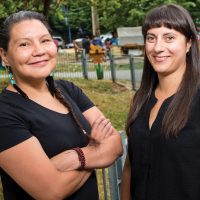
Dr. David Wood with Valory Craske,the first-ever TAVR patient at VGH.
Ordinarily, when someone is diagnosed with valvular heart disease, the only option is open heart surgery, a complicated procedure with a lengthy recovery time. Many patients are too old or frail to withstand the surgery, but without the procedure, they only have a 50% chance of survival.
Fortunately, Vancouver is home to TAVR (transcatheter aortic valve replacement), a new, innovative, minimally invasive treatment that improves patient outcomes. Circulation, the journal of the American Heart Association, calls the TAVR procedure “one of the most exciting events in cardiology in the last 50 years.”
British Columbians currently have unprecedented access to new heart valve technology. Dr. Webb and Dr. Wood are among the foremost and well known surgeons in the world currently performing this revolutionary procedure. With the creation of the new Centre for Heart Valve Innovation in Vancouver, British Columbia is poised to become a global leader in minimally invasive heart valve technology. In recognition of the programs’ clinical and research excellence, companies now come to Vancouver to test their new and constantly evolving valves.
Normally, over half of high-risk or inoperable patients (age 80 and above) would die within a year without open-heart surgery to replace their degenerative aortic valves. Using advanced cardiac imaging, Dr. Wood can now make a small incision in the leg, insert a catheter (a thin, flexible tube) with a new bioprosthetic aortic valve through the femoral artery, and replace the existing diseased valve in approximately 32 minutes with the patient awake and talking. In contrast, open heart surgery in high risk patients requires cutting through the breastbone, stopping the heart and replacing the valve, requiring a minimum of three hours on the operating table, one to two weeks in the hospital, and up to three months’ recovery time.
Dr. Wood and Dr. John Webb, the Canadian pioneer of the technique, have now performed 62 TAVR cases at VGH using a novel Multidisciplinary, Multimodality, but Minimalist (3M) Approach to TAVR. The average patient age was 82 and the predicted risk of death with conventional aortic valve surgery was 8.5%. The observed risk of death with TAVR was only 1.6% in this patient cohort. Most patients were discharged safely home the following day (65%) with a mean length of stay of only 1.7 days. Most patients reported almost immediate resolution of symptoms in the first 1 – 2 days. These unprecedented results were recently presented at the international TCT valve conference in San Francisco. Dr. Wood and Dr. Webb are currently finalizing the research protocols for both the Canadian and International “3M Approach to TAVR Trials” to demonstrate that the results achieved in Vancouver can be replicated at other centres around the world.

Doctors have performed the TAVR procedure on over 60 patients at VGH.
The creation and continued expansion of the Centre for Heart Valve Innovation will require donor funding to ensure the best program possible is built here in Vancouver. Donor help is needed for technologically advanced equipment, research, education and training. The goal is to build a world renowned centre that will save the lives of thousands of British Columbians and whose research will affect the health of people around the globe.”
Support TAVR and the Structural Heart Program.

